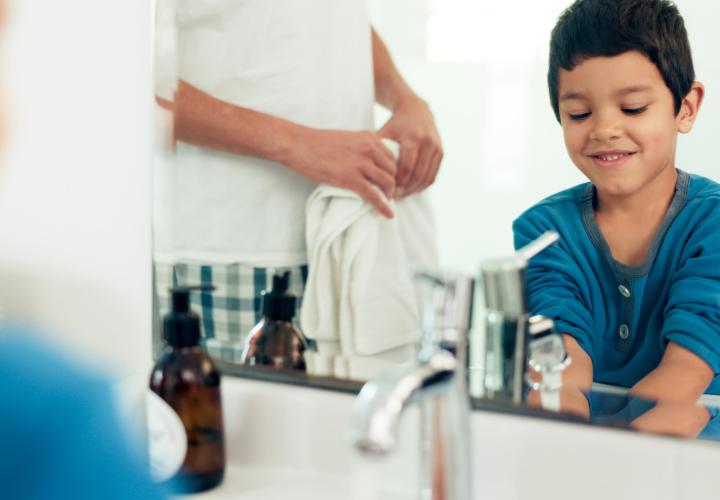Good hygiene habits start young. As kids develop, they reach important milestones and one of the most noticeable ones is personal hygiene. Proper hygiene is your child’s foundation for good health, confidence and a solid social life—and it’s so much more than learning about wearing deodorant. Here is a simple guide for parents to help kids master hygiene, age by age.
Early Childhood (2-5 Years): Learning the Basics
In these years, the parents set the example and still take on the bulk of the responsibility.
- Handwashing: Show your child how to wash their hands properly, using soap and water for at least 20 seconds. Encourage them to wash before meals, after using the bathroom, and after playing outside.
- Brushing teeth: By age 2, kids should start brushing their teeth twice a day with a small amount of toothpaste on a gentle toothbrush. At this age, they’ll need help to actually brush, but you can also let them practice while you watch. Consider their first trip to the dentist around this time, too.
- Bath time: Always stay with your child while they are bathing, but encourage them to wash their body with a cloth and get used to shampooing their hair.
- Potty training: As they learn to use the toilet, teach them to wipe properly, flush, and wash their hands afterward. Hang in there- patience is key.
Elementary School (6-9 Years): Building Independence
By the time children start school, you’ll probably see them paying more attention to personal hygiene and even establishing routines. At this stage, parents can balance independence with reminders and guidance.
- Baths or showers: Kids should bathe or shower regularly, especially after outdoor play or athletic activity.
- Brushing and flossing: Brushing twice a day is always key, and by now, flossing should be part of the mix. Parents should check their work occasionally to ensure they’re doing a thorough job.
- Hair care: Teach them how to comb or brush their hair daily to prevent tangles. For kids with longer hair, learning to tie it back can also help keep it clean.
- Nail care: Show your child how to clip or file their nails. This will help avoid dirt buildup and prevent them from biting their nails.
- Clothing changes: Emphasize why it’s important to wear clean clothes and change socks and underwear daily.
Tweens (10-12 Years): Tackling New Challenges
The preteen years come with big changes, physically and socially. As kids approach puberty, their bodies make more sweat and oil, and they may have noticeable body odor and acne. This is the time to start some more advanced hygiene habits:
- Deodorant: When kids start noticing body odor (often around age 9-11), it’s time to introduce deodorant. Look for mild, unscented, or natural options if your child has sensitive skin. Make it a part of their morning routine.
- Daily showers: Tweens should shower daily, especially after sports or gym class. They should focus on areas prone to odor, like underarms, feet, and private areas.
- Skin care: If your child is starting to develop acne, encourage them to wash their face daily with a gentle cleanser. Help them find a simple skincare routine that works for their skin type
- Shaving: Some tweens may start growing facial or underarm hair. If they want to start shaving, show them how to do it safely and carefully.
Teens (13+ Years): Mastering Self-Care
By the teenage years, most kids can independently manage their hygiene routines. However, they may still need occasional reminders, especially if they’re busy or distracted. At this stage, focus on good habits:
- Regular hygiene: Encourage consistent bathing, toothbrushing, and deodorant use. Athletes may need to shower more often.
- Advanced skin care: Acne is common during puberty, so teens may benefit from specialized products, such as medicated cleansers or spot treatments. If acne becomes severe, consult a dermatologist. Beware of the dangers of adult skincare routines on young skin.
- Oral hygiene: You still might need to reinforce the importance of brushing and flossing to prevent cavities and bad breath. Teens with braces or retainers may need extra care.
- Managing periods: For girls, it’s important to discuss period hygiene, including the use of pads, tampons, or menstrual cups. Open and supportive conversations can help them feel more confident.
- Personal grooming: Talk about shaving, trimming nails, and maintaining a clean hairstyle. Let teens make choices about their grooming preferences while offering guidance when needed.
>Parents, is your teen asking their doctor these 24 questions?
Final tips for parents for setting the stage for good hygiene:
- Lead by example: Kids learn by watching, so model good hygiene habits in your daily routine.
- Make it fun: Use songs, colorful toothbrushes, or reward charts to make hygiene routines enjoyable for younger kids.
- Give them age-appropriate tools: Set kids up with the right tools, like a step stool for reaching the sink or a gentle shampoo for sensitive skin.
- Talk about it: As kids grow older, talk openly about hygiene changes during puberty. Normalize the conversation to make them feel comfortable asking questions.
- Be patient: Every child develops at their own pace. Offer reminders and encouragement without shaming or pressuring them.
Helping kids master personal hygiene is a gradual process that evolves with their age and needs. By teaching them step by step and providing support along the way, parents can help their children develop lifelong habits that promote health, confidence, and well-being.
See Why We’re the Ones Parents Trust
As experts, we’d like to partner with you in your child’s health and well-being, as they grow.
